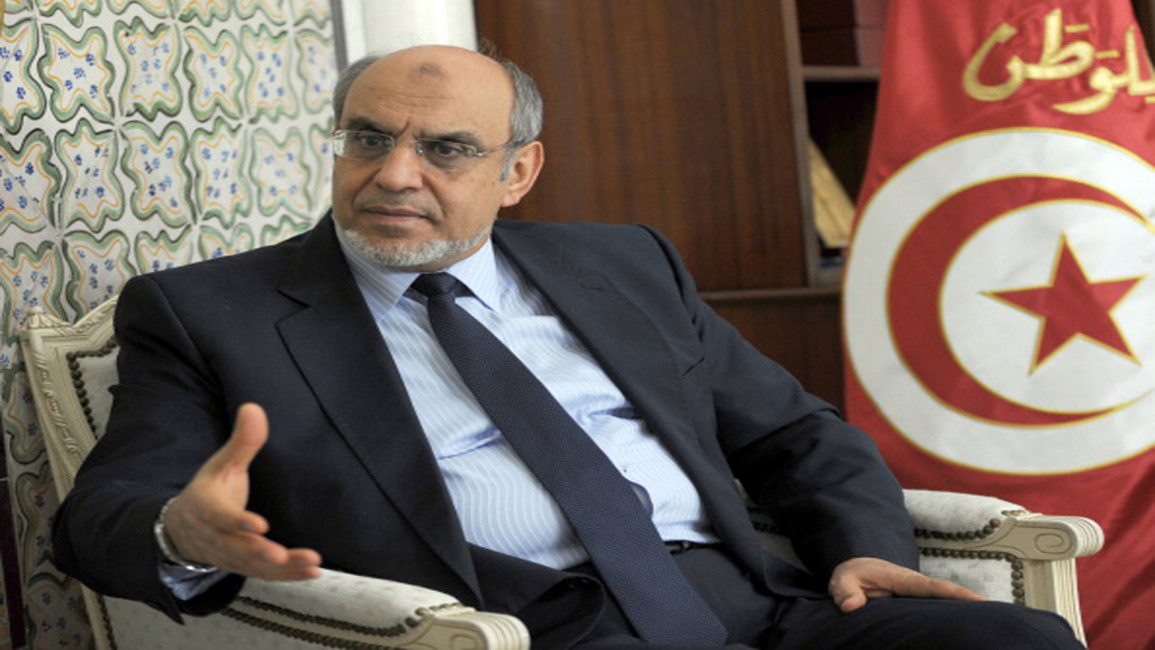
Ennahdha gambles with its future
Ennahdha gambles with its future
The dumping of the number two in the movement indicates that recent events have taken a toll on the party.
3 min read
Hamadi departed Ennahdha with a warning [AFP]
It seems that the Ennahdha movement still has to pay the price for the choices it has made in post-revolutionary Tunisia.
In the recent parliamentary elections, it lost the predominant position in the country's politics, and it has now lost its second-in-charge. Hamadi al-Jebali's resignation is momentous, particularly at the present time, even if it was expected after withdrawing from the party's secretariat.
His formal attendance at the press conference launching Ennahdha's election campaign was a last attempt to save the image of a "united movement".
Jebali was not one of the founders of Ennahdha in the early 1970s. The only remaining members left from the founding generation are Rached Ghannouchi and Abdel Fatah Morro. Some left, willingly or less willingly, others have died, and yet others have opted to stay out of politics altogether.
Nevertheless, Jebali's role as a member of Ennahdha's second generation gradually grew until he led the movement through a critical time under former President Habib Bourguiba.
He was one of the first political prisoners under the rule of the President Zine el Abidine Ben Ali, not just because he ran the movement's al-Fajr newspaper, but also because he oversaw the reestablishment of the group before it collapsed completely, reeling from the severe blows inflicted upon it by the security apparatus.
Dedication
His steadfastness in the more than 16 years he spent in prison, and his determination to rebuild the movement from its remaining sleeper cells after his release, mean that Jebali is highly respected by the leaders and supporters of Ennahdha alike. He was considered to be the likely successor to Ghannouchi.
However, Jebali failed to manage the affairs of the state effectively during his time in office, and Ennahdha did him no favours during his time in the prime minister's office.
Ghannouchi, Ennahdha's leader, reportedly objected strongly to Jebali's attempt to separate the government and the political parties in the Shura Council, and this forced him to resign from the government to save face.
Ennahdha's leaders insisted on keeping power, but lost it a few months later, without even achieving the minimum aim of a technocratic government under Ennahdha's presidency, which Jibali would have guaranteed had he remained in power.
| Jibali was considered to be the likely successor to Ghannouchi. |
The situation is different today.
Jibali's resignation is not the first. Several members withdrew from the movement and founded their own political parties in competition with Ennahdha. The Patriotic Construction Party is one of them, though it has proved to be of only limited influence.
It is unclear if Jebali's resignation will have a major impact on the movement, especially as he has not announced his desire to establish any new political party. He did, however, say he would establish an organisation "to defend freedoms".
His resignation is expected to trigger further departures from the lower ranks of the movement.
Ennahdha's leadership has taken a dangerous gamble by insisting it remain neutral during the second round in the presidential elections, despite internal and external pressure to publicly support Moncef Marzouki.
To maintain credibility and protect the movement from division, Ennahdha's leadership needs two things. The first is for Beji Caid Essebsi to keep his promises to respect public freedoms and not circumvent the revolution's democratic gains, meaning that Tunisia does not return to the days of the old regime. The Islamists were the old regime's first victims.
The second is for the movement to thwart attempts to isolate Ennahdha and force it away from the formation of the next government.
If these fail to happen, Ennahdha will pay a high price and gain nothing. Only then will Jebali's predictions about the failure of Ghannouchi's pragmatism be proven correct.
Opinions expressed in this article remain those of the original author and do not necessarily reflect the opinions of al-Araby al-Jadeed, its editorial board or staff.
This is an edited translation from our Arabic edition.



